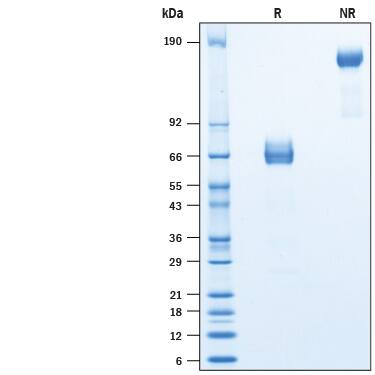Recombinant Rat TIM-3 Fc Chimera Protein, CF
R&D Systems, part of Bio-Techne | Catalog # 10489-TM

Key Product Details
Source
NS0
Accession #
Structure / Form
Disulfide-linked homodimer
Conjugate
Unconjugated
Applications
Bioactivity
Product Specifications
Source
Mouse myeloma cell line, NS0-derived rat TIM-3 protein
| Rat TIM-3 (Leu22-Ala194) Accession # P0C0K5.2 |
IEGRMD | Mouse IgG1 (Pro100-Lys330) |
| N-terminus | C-terminus |
Purity
>95%, by SDS-PAGE visualized with Silver Staining and quantitative densitometry by Coomassie® Blue Staining.
Endotoxin Level
<0.10 EU per 1 μg of the protein by the LAL method.
N-terminal Sequence Analysis
Leu22
Predicted Molecular Mass
46 kDa
SDS-PAGE
60-75 kDa, under reducing conditions
Activity
Measured by its binding ability in a functional ELISA.
When Recombinant Human Galectin-9 Protein (Catalog # 2045-GA) is immobilized at 1.0 µg/mL (100 µL/ well), Recombinant Rat TIM‑3 Fc Chimera (Catalog # 10489-TM) that produces a 50% optimal binding response is found to be 20-120 ng/mL
When Recombinant Human Galectin-9 Protein (Catalog # 2045-GA) is immobilized at 1.0 µg/mL (100 µL/ well), Recombinant Rat TIM‑3 Fc Chimera (Catalog # 10489-TM) that produces a 50% optimal binding response is found to be 20-120 ng/mL
Scientific Data Images for Recombinant Rat TIM-3 Fc Chimera Protein, CF
Recombinant Rat TIM-3 Fc Chimera Protein SDS-PAGE
2 μg/lane of Recombinant Rat TIM-3 Fc Chimera Protein (10489-TM) was resolved with SDS-PAGE under reducing (R) and non-reducing (NR) conditions and visualized by Coomassie® Blue staining, showing bands at 60-75 kDa and 120-150 kDa, respectively.
Formulation, Preparation and Storage
10489-TM
| Formulation | Lyophilized from a 0.2 μm filtered solution in PBS with Trehalose. |
| Reconstitution | Reconstitute at 250 μg/mL in PBS. |
| Shipping | The product is shipped at ambient temperature. Upon receipt, store it immediately at the temperature recommended below. |
| Stability & Storage | Use a manual defrost freezer and avoid repeated freeze-thaw cycles.
|
Background: TIM-3
References
- Sakuishi, K. et al. (2011) Trends Immunol. 32:345.
- Anderson, A.C. (2012) Curr. Opin. Immunol. 24:213.
- Wolf, Y. et al. (2020) Nature Reviews Immunology 20:173.
- Nakayama, M. et al. (2009) Blood 113:3821.
- Anderson, A.C. et al. (2007) Science 318:1141.
- Wiener, Z. et al. (2007) J. Invest. Dermatol. 127:906.
- Chiba, S. et al. (2012) Nat. Immunol. 13:832.
- Sanchez-Fueyo, A. et al. (2003) Nat. Immunol. 4:1093.
- Ndhlovu, L.C. et al. (2012) Blood 119:3734.
- Gleason, M.K. et al. (2012) Blood 119:3064.
- Zhu, C. et al. (2005) Nat. Immunol. 6:1245.
- Sakhdari, A. et al. (2012) PLoS ONE 7:e40146.
- Sabatos, C.A. et al. (2003) Nat. Immunol. 4:1102.
- Dardalhon, V. et al. (2010) J. Immunol. 185:1383.
Long Name
T Cell Immunoglobulin Mucin-3
Alternate Names
CD366, HAVcr-2, HAVCR2, KIM-3, SPTCL, TIM3, TIMD3
Entrez Gene IDs
Gene Symbol
HAVCR2
UniProt
Additional TIM-3 Products
Product Documents for Recombinant Rat TIM-3 Fc Chimera Protein, CF
Product Specific Notices for Recombinant Rat TIM-3 Fc Chimera Protein, CF
For research use only
